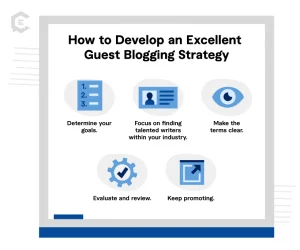Guest Blogging Strategy: A Comprehensive Guide for SEO
Introduction Of Guest Blogging
Guest blogging strategy has emerged as one of the most effective strategies for building backlinks, improving website authority, and driving traffic to your site. Guest blogging entails authoring and publishing articles on third-party websites or blogs related to your sector in exchange for a hyperlink to your site. It’s a strategy that not only boosts your SEO efforts but also helps establish your brand as a thought leader, increases visibility, and builds relationships within your industry.
In this post, we will explore why guest blogging is a valuable off-page SEO strategy, how it works, and how you can use it effectively to boost your website’s SEO.
-
Why Guest Blogging Matters for SEO
Before diving into the details, it’s important to understand why guest blogging matters for SEO and how it can enhance your website’s search engine performance. Here are the key benefits:
- Top-Tier Backlinks: A key objective of guest blogging is to obtain valuable backlinks. By submitting a guest post on a respected website, you create a link to your site, indicating to search engines such as Google that your site is trustworthy and influential. These backlinks can help boost your domain authority and overall search rankings.
- Increase Website Traffic: By publishing on a site with an established audience, you can direct traffic back to your website. If your guest post provides value and engages the readers, they’re more likely to visit your site and explore your offerings.
- Brand Exposure: Guest blogging puts your brand in front of a new and potentially interested audience. It allows you to showcase your expertise and ideas, helping build brand awareness.
- Networking and Building Relationships: Guest blogging can also help you build relationships with other influencers, bloggers, and businesses in your industry. These contacts may lead to additional collaboration opportunities and guest blogging opportunities.
-
How Guest Blogging Works
The process of guest blogging generally follows a straightforward sequence. Here’s how it works:

- Identify Relevant Websites: The first step is identifying reputable websites or blogs that align with your niche or industry. Look for platforms that have a strong readership, high domain authority, and an engaged audience. Make sure the content on these sites aligns with your brand and your target market.
- Pitch Your Ideas: After finding suitable blogs, reach out to the site owners or editors. Craft a personalized pitch that explains why your content would be valuable to their readers. Share your expertise, outline potential blog topics, and emphasize how the guest post can offer something new or helpful to their audience.
- Produce Excellent Content: Once your proposal is approved, the following task is to compose the guest article. Focus on creating well-researched, original, and informative content that adds value. The better the quality of the content, the more likely it is that the site will approve your post and the audience will engage with it.
- Insert Relevant Backlinks: In your guest post, include backlinks to relevant pages on your website. These backlinks should fit naturally within the content and provide value to readers. Avoid excessive link placement or over-optimization, as this can result in penalties.
- Promote the Post: Once the guest post is published, make sure to promote it on your own social media channels, newsletters, and other platforms. By driving traffic to the guest post, you increase your chances of earning more backlinks, shares, and comments.
-
Guest Blogging Best Practices
While guest blogging can be incredibly beneficial for SEO, it’s important to follow some best practices to maximize its effectiveness. Here are a few tips to ensure your guest blogging efforts are successful:
- Focus on Quality, Not Quantity: When selecting websites to guest blog on, prioritize quality over quantity. A small number of high-quality backlinks from trustworthy websites will influence your SEO more effectively than numerous low-quality backlinks from unrelated or spammy sources.
- Provide Value to the Audience: Always write content that is valuable and useful to the readers of the host blog. Content that educates, informs, or entertains is more likely to generate engagement, shares, and, ultimately, traffic to your site.
- Avoid Over-Promotion: While it’s important to include backlinks to your website, avoid being overly promotional in your guest post. Focus on providing insightful content and subtly incorporating your brand into the post. Readers are more likely to respond positively to content that isn’t just a sales pitch.
- Tailor Content to the Audience: Understand the audience of the site you’re writing for, and tailor your content to meet their interests and needs. For example, if you’re guest blogging on an industry news site, your content should focus on trends and updates. If you’re writing for a niche product blog, your content should be more product-focused but still offer value.
- Build Relationships: Guest blogging is about more than just backlinks. It’s an opportunity to build relationships with other bloggers, businesses, and influencers in your field. Cultivate these relationships by interacting with the site owners, sharing their content, and offering to collaborate on future projects.
-
How to Measure the Success of Guest Blogging
Guest blogging is an ongoing strategy that requires patience, but with proper measurement, you can assess the effectiveness of your efforts. Here’s how you can measure the success of your guest blogging campaigns:
- Traffic: Track the referral traffic that comes from the guest post. Use tools like Google Analytics to see how many visitors clicked on your backlink and came to your site. Higher traffic indicates that the post is successful in reaching the audience.
- Backlink Quality: Use tools like Ahrefs or SEMrush to check the quality and authority of the backlinks you’ve earned. A high-quality backlink from a trusted domain can significantly improve your SEO performance.
- Engagement: Pay attention to the level of engagement on the guest post. Are readers leaving comments or sharing the post? The more engaged the audience, the more effective your guest blogging strategy is at building brand authority and driving traffic.
- Conversions: Ultimately, the goal of any SEO strategy is conversions whether that means sales, sign-ups, or leads. Track how many conversions come from the traffic generated by guest posts. This will give you a sense of how well your guest blog is driving tangible results.
Conclusion
Guest blogging remains one of the most effective off-page SEO strategies for boosting website authority, driving traffic, and building backlinks. By carefully selecting high-quality sites to contribute to, creating valuable content, and leveraging your backlinks effectively, you can significantly improve your search engine rankings. However, success in guest blogging goes beyond SEO benefits it’s about establishing yourself as an authority in your industry, building relationships, and contributing valuable knowledge to your field.
I have already published blog post on The Power of Influencer Outreach for SEO










